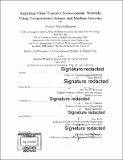| dc.contributor.advisor | Alex "Sandy" Pentland and John R. Williams. | en_US |
| dc.contributor.author | Alabdulkareem, Ahmad | en_US |
| dc.contributor.other | Massachusetts Institute of Technology. Department of Civil and Environmental Engineering. | en_US |
| dc.date.accessioned | 2018-11-28T15:43:16Z | |
| dc.date.available | 2018-11-28T15:43:16Z | |
| dc.date.copyright | 2018 | en_US |
| dc.date.issued | 2018 | en_US |
| dc.identifier.uri | http://hdl.handle.net/1721.1/119325 | |
| dc.description | Thesis: Ph. D. in Computational Science & Engineering, Massachusetts Institute of Technology, Department of Civil and Environmental Engineering, 2018. | en_US |
| dc.description | Cataloged from PDF version of thesis. | en_US |
| dc.description | Includes bibliographical references (pages 133-141). | en_US |
| dc.description.abstract | By 2050, it is expected that 66% of the world population will be living in cities. The urban growth explosion in recent decades has raised many questions concerning the evolutionary advantages of urbanism, with several theories delving into the multitude of benefits of such efficient systems. This thesis focuses on one important aspect of cities: their social dimension, and in particular, the social aspect of their complex socioeconomic fabric (e.g. labor markets and social networks). Economic inequality is one of the greatest challenges facing society today, in tandem with the eminent impact of automation, which can exacerbate this issue. The social dimension plays a significant role in both, with many hypothesizing that social skills will be the last bastion of differentiation between humans and machines, and thus, jobs will become mostly dominated by social skills. Using data-driven tools from network science, machine learning, and computational science, the first question I aim to answer is the following: what role do social skills play in today's labor markets on both a micro and macro scale (e.g. individuals and cities)? Second, how could the effects of automation lead to various labor dynamics, and what role would social skills play in combating those effects? Specifically, what are social skills' relation to career mobility? Which would inform strategies to mitigate the negative effects of automation and off-shoring on employment. Third, given the importance of the social dimension in cities, what theoretical model can explain such results, and what are its consequences? Finally, given the vulnerabilities for invading individuals' privacy, as demonstrated in previous chapters, how does highlighting those results affect people's interest in privacy preservation, and what are some possible solutions to combat this issue? | en_US |
| dc.description.statementofresponsibility | by Ahmad Alabdulkareem. | en_US |
| dc.format.extent | 141 pages | en_US |
| dc.language.iso | eng | en_US |
| dc.publisher | Massachusetts Institute of Technology | en_US |
| dc.rights | MIT theses are protected by copyright. They may be viewed, downloaded, or printed from this source but further reproduction or distribution in any format is prohibited without written permission. | en_US |
| dc.rights.uri | http://dspace.mit.edu/handle/1721.1/7582 | en_US |
| dc.subject | Civil and Environmental Engineering. | en_US |
| dc.title | Analyzing cities' complex socioeconomic networks using computational science and machine learning | en_US |
| dc.type | Thesis | en_US |
| dc.description.degree | Ph. D. in Computational Science & Engineering | en_US |
| dc.contributor.department | Massachusetts Institute of Technology. Department of Civil and Environmental Engineering | |
| dc.identifier.oclc | 1062587395 | en_US |
